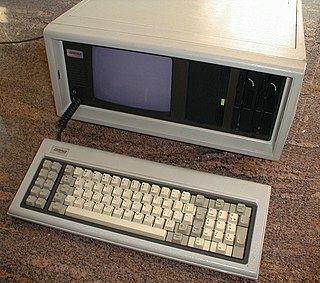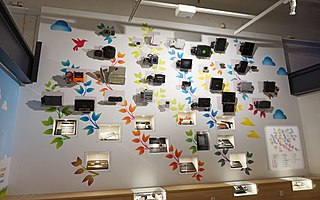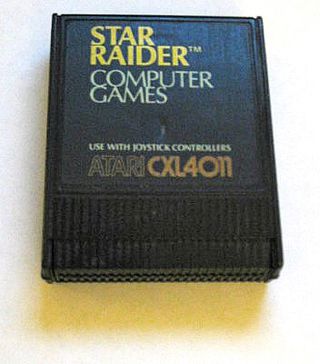
A handheld game console, or simply handheld console, is a small, portable self-contained video game console with a built-in screen, game controls and speakers. Handheld game consoles are smaller than home video game consoles and contain the console, screen, speakers, and controls in one unit, allowing players to carry them and play them at any time or place.

The history of video games began in the 1950s and 1960s as computer scientists began designing simple games and simulations on minicomputers and mainframes. Spacewar! was developed by Massachusetts Institute of Technology (MIT) student hobbyists in 1962 as one of the first such games on a video display. The first consumer video game hardware was released in the early 1970s. The first home video game console was the Magnavox Odyssey, and the first arcade video games were Computer Space and Pong. After its home console conversions, numerous companies sprang up to capture Pong's success in both the arcade and the home by cloning the game, causing a series of boom and bust cycles due to oversaturation and lack of innovation.

A Pocket PC is a class of personal digital assistant (PDA) that runs the Windows Mobile or Windows Embedded Compact operating system that has some of the abilities of modern desktop PCs. The name was introduced by Microsoft in 2000 as a rebranding of the Palm-size PC category. Some of these devices also had integrated phone and data capabilities, which were called Pocket PC Phone Edition. Windows "Smartphone" is another Windows CE based platform for non-touch flip phones or dumber phones.

A portable computer is a computer designed to be easily moved from one place to another, as opposed to those designed to remain stationary at a single location such as desktops and workstations. These computers usually include a display and keyboard that are directly connected to the main case, all sharing a single power plug together, much like later desktop computers called all-in-ones (AIO) that integrate the system's internal components into the same case as the display. In modern usage, a portable computer usually refers to a very light and compact personal computer such as a laptop, subnotebook or handheld PC, while touchscreen-based handheld ("palmtop") devices such as tablets, phablets and smartphones are called mobile devices instead.

A home video game console is a video game console that is designed to be connected to a display device, such as a television, and an external power source as to play video games. While initial consoles were dedicated units with only a few games fixed into the electronic circuits of the system, most consoles since support the use of swappable game media, either through game cartridges, optical discs, or through digital distribution to internal storage.

Blockout is a puzzle video game published in 1989 by California Dreams. It was developed in Poland by Aleksander Ustaszewski and Mirosław Zabłocki. American Technos published an arcade version. Blockout is an unlicensed, 3D version of Tetris.
The history of video game consoles, both home and handheld, began in the 1970s. The first console that played games on a television set was the 1972 Magnavox Odyssey, first conceived by Ralph H. Baer in 1966. Handheld consoles originated from electro-mechanical games that used mechanical controls and light-emitting diodes (LED) as visual indicators. Handheld electronic games had replaced the mechanical controls with electronic and digital components, and with the introduction of Liquid-crystal display (LCD) to create video-like screens with programmable pixels, systems like the Microvision and the Game & Watch became the first handheld video game consoles.

The Atari Portfolio is an IBM PC-compatible palmtop PC, released by Atari Corporation in June 1989. It was the first palmtop computer compatible with the IBM PC ever released.
1979 saw many sequels and prequels in video games, such as Space Invaders Part II and Super Speed Race, along with new titles such as Asteroids, Football, Galaxian, Head On, Heiankyo Alien, Monaco GP, Sheriff and Warrior. For the second year in a row, the highest-grossing video game was Taito's arcade game Space Invaders and the best-selling home system was the Atari Video Computer System.

A pocket computer is a class of handheld computer characterized by very short displays and calculator-style alphanumeric keypads. Pocket computers occupy a small footprint, allowing the unit to be comfortably stashed in one's pocket when on the go, and usually weigh less than 1 pound (0.45 kg). Many feature a port for an expansion chassis, allowing the computers to be used with external peripherals.

A handheld personal computer (PC), typically built around either a clamshell form factor or a gaming form factor with a gamepad integrated for video games, is a mobile device that is significantly smaller than any standard personal computer (PC), but based on the same principles as PCs. The clamshell form factor is sometimes referred to as a palmtop computer, not to be confused with Palmtop PC which was a name used mainly by Hewlett-Packard.
A dedicated console is a video game console that is limited to one or more built-in video game or games, and is not equipped for additional games that are distributed via ROM cartridges, discs, downloads or other digital media. Dedicated consoles were popular in the first generation of video game consoles until they were gradually replaced by second-generation video game consoles that use ROM cartridges.
Atari Corporation was an American manufacturer of home computers and video game consoles. It was founded by Jack Tramiel on May 17, 1984, as Tramel Technology, Ltd., but then took on the Atari name less than two months later when Warner Communications sold the home gaming and computing assets of Atari, Inc. to Tramiel.

A ROM cartridge, usually referred to in context simply as a cartridge, cart, or card, is a replaceable part designed to be connected to a consumer electronics device such as a home computer, video game console or, to a lesser extent, electronic musical instruments.

The Dingoo is a handheld gaming console that supports music and video playback and open game development. The system features an on-board radio and recording program. It was sold to consumers in three colors: white, black, and pink. It was released in February 2009 and had sold over 1 million units.

A Palmtop PC was an approximately pocket calculator-sized, battery-powered computer compatible with the IBM Personal Computer in a horizontal clamshell design with integrated keyboard and display. It could be used like a subnotebook, but was light enough to be comfortably used handheld as well. Most Palmtop PCs were small enough to be stored in a user's shirt or jacket pockets.

GPD Win is a Windows-based palmtop computer equipped with a keyboard and video game controls. It is an x86-based computer that runs Windows 10. It is capable of running any x86 Windows-based application that can run within the confines of the computer's hardware. First announced in October 2015, it was crowdfunded via Indiegogo and two other crowdfunding sites in Japan and China. The GPD Win was released in October 2016.

The Evercade is a handheld game console developed and manufactured by British company Blaze Entertainment. It focuses on retrogaming with ROM cartridges that each contain a number of emulated games. Evercade was released in May 2020 and upon its launch offered 10 game cartridges with a combined total of 122 games.













